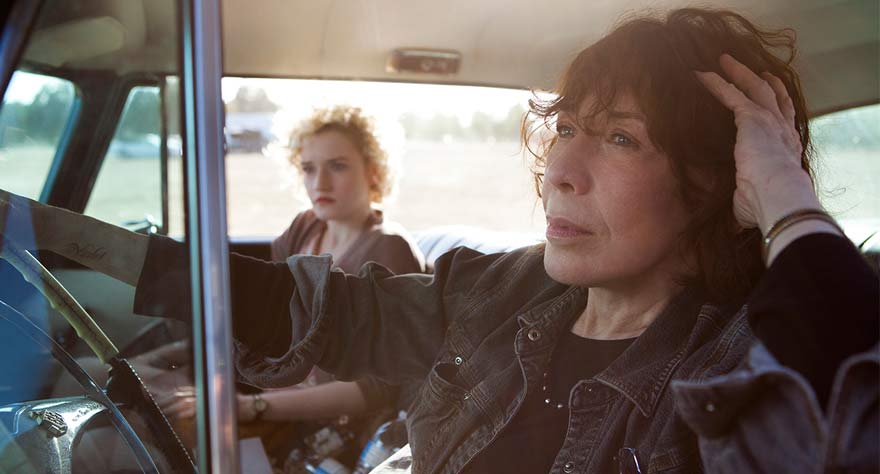
Lily Tomlin shines as a feminist widow who tries to scare up the money for her pregnant granddaughter's abortion.


Lily Tomlin shines as a feminist widow who tries to scare up the money for her pregnant granddaughter's abortion.

An actor earns serious credit when they not only perform incredibly in a role but perform it in a way that makes audiences believe no one else could have possibly played it better. Not to overly gush about a film others have already gushed enough over, but I was oozing with said respect when exiting Grandma. Not only is it a well-written film with a rare and fiercely defined main character, but its title role fits its perfectly casted actor, Lily Tomlin, in perfect symbiosis. Playing this role at this point in her career is perfect timing, and Paul Weitz casting and utilizing her unique talents is an example of the art of directing at its finest. Though comedy might be the safest genre for allowing septuagenarians to shine (though Grandma is more a part of that ambiguous sub-genre of dramedy), it’s films like this that prove there is a trove of older actors who, in addition to the talent they already bring, provide another level of performance that, when given the chance, can absolutely blow us away.
This secret reserve of talent—likely derived straight from life experience—is something Tomlin displays in abundance in Grandma. A taciturn and grieving widow, Tomlin plays Elle Reid, a feminist poet and movement leader, still revered if not much remembered from her glory days. A year and a half has passed since her partner Violet has died from cancer, and her relationship with a much younger woman, Olivia (Judy Greer), is ending and she deals with it with the same cutting rigidity with which she faces all of life’s challenges, telling Olivia she doesn’t love her, and to leave her key on the table. Elle hardly has time to actually process this breakup when her teenaged granddaughter Sage (the curly-haired goddess Julia Garner) shows up on her front door, pregnant and in need of funds for an abortion.
Elle does her due diligence as a grandma—complaining about the price of an abortion these days—and also as a wizened woman, asking Sage if she’s thought through the decision since she’s likely to think of it at some point every day for the rest of her life, but never tries to talk her out of it. Instead, she grabs the keys to her vintage Dodge and agrees to help Sage scare up the $600 she needs by 5:30 that afternoon. As Elle attempts to collect on old debts and the goodwill of friends, more of her varied and complicated life is revealed. Laverne Cox is a tattoo artist buddy who tells of Elle’s kindhearted gift of loaning her money to fix a botched transgender boob-job. Elizabeth Pena is coffee shop owner who puts Elle in her place by offering $50 for some of her old first edition hardbacks, including The Feminine Mystique (and Sage wonders aloud if the book has anything to do with The X-Men). Elle challenges Sage’s sensibilities, teaching her along the way by standing up to her deadbeat boyfriend when Sage won’t (hilariously kicking the teenager’s ass) and making a scene in a coffee shop when the proprietor asks her to quiet down when discussing abortion.
While clearly pro-choice, the film doesn’t especially try to conventionalize or even trivialize abortion but instead bring it into colloquial terms. Sage’s decision is treated with gravity and respect. It’s even given an interesting dual-perspective by another character in the film, who expresses the sadness an abortion once brought them with sincerity and dignity. The crux of the film lies within a scene between Elle and her one-time husband Karl (Sam Elliott, also absolutely shining), he an unfortunate casualty of Elle being gay at a time when no one was discussing such things and thus part of her path of destruction in her youth. They chit-chat about lovers and grandchildren, roll a doobie together, and then go on to have a fiercely charged and emotionally revealing series of exchanges that perfectly expresses the complexity of real relationships, the many forms of love, and the way our decisions shape us and stay with us as we mature.
Paul Weitz is a wonder in being able to capture saturated morsels of the different humor associated with different age ranges and genders. In American Pie he nailed the adolescent male mind without demeaning it, and here he’s traveled the length of the spectrum (galaxy?) to home in on the perfectly evolved humor of an aging widowed lesbian academic. I’ve certainly never heard anyone insult another by calling them a “writer-in -residence” but the joke is among the sharpest of the film. All involved should certainly remain in the minds of voters when awards season rolls around.
Filled with laughs, realistic love, and a freedom to emote, Grandma is as cathartic as it is hilarious. Even while seeing the pain that comes from a lifetime filled with loss and experience, the wisdom and humor of a lifetime’s experience is given equal merit. It’s enough to make being a grandma look like the coolest job out there, and a reason to look forward to advancing through our years.
A version of this review was originally published as part of our Tribeca 2015 coverage.